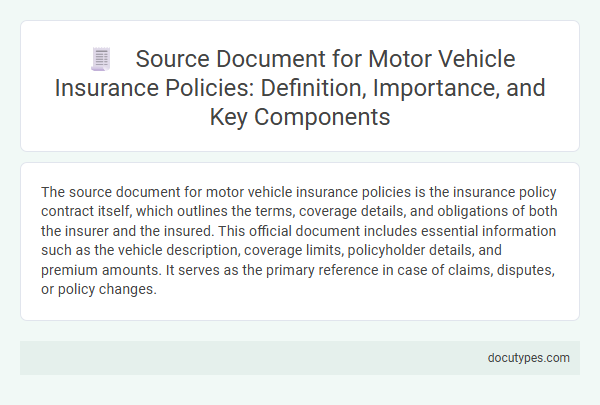The source document for motor vehicle insurance policies is the insurance policy contract itself, which outlines the terms, coverage details, and obligations of both the insurer and the insured. This official document includes essential information such as the vehicle description, coverage limits, policyholder details, and premium amounts. It serves as the primary reference in case of claims, disputes, or policy changes.
Introduction to Source Documents in Motor Vehicle Insurance
What is the source document for motor vehicle insurance policies? The primary source document for motor vehicle insurance is the insurance policy contract issued by the insurer. This document outlines the terms, coverage details, and obligations essential to your motor vehicle insurance agreement.
Defining Source Documents for Motor Insurance Policies
| Term | Definition |
|---|---|
| Source Document | The original record or evidence from which motor vehicle insurance policies are created. It serves as the foundational data for underwriting, claims, and policy issuance. |
| Motor Vehicle Insurance Policy | A contract between the insurer and the vehicle owner that provides financial protection against losses resulting from accidents, theft, or damages involving the insured vehicle. |
| Types of Source Documents | Includes vehicle registration certificates, driver's license copies, previous insurance policy documents, vehicle inspection reports, and claim forms. |
| Purpose of Source Documents | Verify vehicle ownership, validate driver eligibility, assess risk factors, and confirm details essential to issuing accurate and compliant motor vehicle insurance policies. |
| Importance in Motor Insurance | Ensures accuracy and authenticity of policy information; critical for underwriting decisions, claim processing, and regulatory compliance. |
Importance of Source Documents in Insurance Underwriting
Source documents serve as the foundational records for motor vehicle insurance policies, ensuring accurate underwriting and risk assessment. These documents provide verified information necessary for policy validation and claims processing.
- Verification of Vehicle Details - Source documents like registration certificates confirm the exact make, model, and year of the insured vehicle.
- Proof of Ownership - Ownership documents establish legal possession, crucial for policy issuance and claim legitimacy.
- Risk Assessment Accuracy - Accurate source data enables underwriters to evaluate risk factors effectively, leading to appropriate premium pricing.
Legal Significance of Insurance Source Documents
The source document for motor vehicle insurance policies is typically the insurance proposal form or the policy contract signed by the insured. This document serves as the primary evidence of the agreement between the insurer and the policyholder, detailing coverage terms and obligations.
Legally, the source document holds critical significance as it establishes the contractual basis for claims and dispute resolution. Courts refer to these documents to interpret the insurer's liability and verify compliance with regulatory requirements in motor vehicle insurance cases.
Types of Source Documents Used in Motor Vehicle Insurance
Source documents are essential in motor vehicle insurance as they provide the verified details needed to issue and manage policies. These documents authenticate the vehicle and the policyholder's information, ensuring accurate coverage and claims processing.
- Registration Certificate (RC) - Serves as proof of vehicle ownership and details such as make, model, and registration number.
- Driving License - Confirms the policyholder's legal eligibility to drive and their identity.
- Proof of Address - Used to verify the insured person's residential address for communication and legal purposes.
- Previous Insurance Policy - Provides history of coverage, claims, and no-claim bonus entitlement.
- Vehicle Inspection Report - Details the condition of the vehicle, often required for policy issuance or renewal.
These source documents collectively ensure that motor vehicle insurance policies are accurately tailored and legally compliant.
Essential Components of a Motor Insurance Source Document
The source document for motor vehicle insurance policies is the insurance policy contract issued by the insurer. It serves as the primary legal evidence detailing the coverage, terms, and conditions agreed upon.
Essential components of a motor insurance source document include the policyholder's information, vehicle details, and coverage specifics such as liability, collision, and comprehensive insurance. It also contains the policy period, premium amount, and exclusions or limitations. This document ensures clarity and protection for both the insurer and insured in case of claims or disputes.
Role of Source Documents in Claims Settlement
The source document for motor vehicle insurance policies is the insurance policy contract itself, which outlines the terms, coverage, and conditions agreed upon. This document serves as the primary reference during the claims settlement process to verify policy validity and coverage details.
During claims settlement, the source document plays a crucial role in ensuring accurate assessment of the claim against the policy terms. Your claims adjuster relies on this document to determine eligibility, coverage limits, and any exclusions, facilitating a smooth and transparent settlement process.
Verification and Validation of Source Documents
The source document for motor vehicle insurance policies is typically the insurance proposal form filled out by the applicant. Verification involves cross-checking the details in the proposal form with official documents such as the vehicle registration certificate and the driver's license. Validation ensures the authenticity and accuracy of the data before the insurance policy is issued, reducing risks of fraud and errors.
Common Issues with Motor Insurance Source Documentation
The source document for motor vehicle insurance policies is the original insurance contract or policy schedule provided by the insurer. This document outlines the terms, coverage details, and insured vehicle information essential for any claims or policy adjustments.
- Incomplete Documentation - Missing information or signatures on the policy can lead to claim disputes or delays.
- Incorrect Vehicle Details - Errors in vehicle identification or owner information may cause coverage issues.
- Expired or Outdated Documents - Using old or expired policy documents can result in denied claims or coverage gaps.
What Is the Source Document for Motor Vehicle Insurance Policies? Infographic

